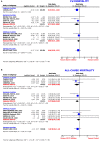Cardiovascular Outcome in Patients Treated With SGLT2 Inhibitors for Heart Failure: A Meta-Analysis
- PMID: 34336954
- PMCID: PMC8316592
- DOI: 10.3389/fcvm.2021.691907
Cardiovascular Outcome in Patients Treated With SGLT2 Inhibitors for Heart Failure: A Meta-Analysis
Abstract
Background: Sodium-glucose co-transporter 2 (SGLT2) inhibitors are an emerging class of glucose-lowering drugs that have become increasingly relevant for the treatment and prevention of heart failure (HF). Therefore, we aimed to investigate various SGLT2 inhibitors in patients with established HF at baseline and focused on the different types of HF. Methods: An extensive search of PubMed and Web of Science until January 2021 was done. Two reviewers, independently and in duplicate, applied the selection criteria. This meta-analysis was conducted according to the PRISMA guidelines. Data were pooled using a random-effects model. Randomized controlled trials (RCTs) of SGLT2 inhibitors vs. a comparator in patients with HF reporting clinical outcomes were included. The primary efficacy outcome was the composite of hospitalization for HF (HHF) or cardiovascular (CV) mortality. All-cause mortality, CV mortality, and HHF were considered as secondary endpoints. Subgroup analyses involving the status of diabetes, type of HF, administered type of SGLT2 inhibitor, sex, age, body mass index (BMI), estimated glomerular filtration rate (eGFR), cause of HF, and concomitant medication were performed. Results: Seventeen RCTs, comprising a total of 20,749 participants, were included (n = 10,848 treated with SGLT2 inhibitors and n = 9,901 treated with a comparator). Treatment with SGLT2 inhibitors in a HF population was associated with a 27% relative risk reduction (RRR) of HHF or CV mortality [risk ratio (RR) = 0.73, 95% CI = 0.68-0.78], 32% RRR of HHF (RR = 0.68, 95% CI = 0.62-074), 18% RRR of CV mortality (RR = 0.82, 95% CI = 0.73-0.91), and 17% RRR of all-cause mortality (RR = 0.83, 95% CI = 0.75-0.91). The effect of SGLT2 inhibitors on the primary endpoint was consistent among the different gliflozines. The effect of SGLT2 inhibitors on the primary endpoint was independent of underlying diabetes mellitus, age, sex, BMI, renal function, and HF type. Conclusions: SGLT2 inhibitors are associated with improved CV outcomes in patients with HF.
Keywords: SGLT2 inhibitors; clinical outcome; heart failure; meta-analysis; pharmacotherapy.
Copyright © 2021 Gager, Gelbenegger, Jilma, von Lewinski, Sourij, Eyileten, Filipiak, Postula and Siller-Matula.
Conflict of interest statement
DL has unrestricted research grants from Boehringer Ingelheim, MSD, and Novartis; is on the Speakers' Bureau of Astra Zeneca, Bayer, Boehringer Ingelheim, and NovoNordisk; and is an advisor for Bayer. HS has unrestricted research grants from Boehringer Ingelheim, Eli Lilly, MSD, NovoNordisk, and Sanofi and is on the Speakers' Bureau of AstraZeneca, Amgen, Boehringer Ingelheim, BMS, Eli Lilly, NovoNordisk, Novartis, and Sanofi. JMSM received lecture fees from Bayer, Daiichi, Chiesi and BMS, unrelated to this publication. The remaining authors declare that the research was conducted in the absence of any commercial or financial relationships that could be construed as a potential conflict of interest.
Figures







Comment in
-
Commentary: Cardiovascular Outcome in Patients Treated With SGLT2 Inhibitors for Heart Failure: A Meta-Analysis.Front Cardiovasc Med. 2021 Oct 26;8:778284. doi: 10.3389/fcvm.2021.778284. eCollection 2021. Front Cardiovasc Med. 2021. PMID: 34765660 Free PMC article. No abstract available.
References
Publication types
LinkOut - more resources
Full Text Sources
Research Materials
Miscellaneous

